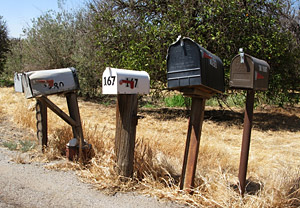 This has not been a good week for the legacy of Warren G. Harding, 29th President of the U.S., 1921 –1923. Harding’s failures as President have been extensively documented. His short-lived administration was rocked by corruption and scandal overshadowed his accomplishments, resulting in his rankings being consistently the lowest of all of the U.S. Presidents. And now his indiscreet letters have been revealed.
This has not been a good week for the legacy of Warren G. Harding, 29th President of the U.S., 1921 –1923. Harding’s failures as President have been extensively documented. His short-lived administration was rocked by corruption and scandal overshadowed his accomplishments, resulting in his rankings being consistently the lowest of all of the U.S. Presidents. And now his indiscreet letters have been revealed.
The Library of Congress has unsealed his previously unpublished letters to his mistress, Carrie Fulton Phillips, the wife of one of his close friends. The letters, mostly written prior to his Presidency, are salacious, revealing him not only as a lothario, but also as a person with extremely poor judgment. Phillips, as it turned out, had German sympathies prior to and following World War I and later threatened to expose Harding’s foibles to the Germans; was unfaithful, not only to her husband, but to Harding, as well; and, in collusion with her husband, threatened to blackmail Harding with the letters.
The pundits have had incredible fun with all of this. The release of the letters resulted in international news coverage, including stories on CNN and MSNBC, the Huffington Post, and John Oliver’s Last Week Tonight. A thoughtful article by Jordan Michael Smith inThe New York Times Magazine, “All the President’s Pen,” chronicles the whole sordid affair, including excerpts from the damaging letters.
Once posted, letters sent by regular mail, as well as most email, cannot be retrieved. It is a federal crime to tamper with a mailbox. All the more reason to be very careful with what one puts in writing. But things were not always so.
A permanent exhibition at the Smithsonian’s Post Office Museum describes early mail service: “The American colonies began as lonely coastal settlements, separated by dense forests. Settlers were more eager for news of their families and homelands overseas than for news from other colonies. The British government, however, needed reliable mail service throughout the American colonies for official communications with colonial governors.”
Benjamin Franklin was appointed by the Crown as Postmaster of Philadelphia in 1737, and later was appointed co-Postmaster General for the colonies in 1761. According to the U.S.P.S. publication, The United States Postal Service: An American History 1775 – 2006, Franklin made significant improvements to postal routes and post offices, and established night delivery between Philadelphia and New York to speed service.
The British, however, were not happy with Franklin’s pro-revolutionary activities, and he was fired in 1774. The mail was not secure from prying British eyes. Shortly after Franklin was dismissed, William Goddard, a printer and newspaper publisher, established an alternate mail service, the Constitutional Post, in order to protect his newspaper from confiscation. It was approved by the Continental Congress, one year before the Revolution, and formed the foundation for the U.S. Postal system.
Goddard wrote: “Letters were liable to be stopped & opened by ministerial mandates, & their Contents construed into treasonable Conspiracies; and News Papers, those necessary and important vehicles, especially in Times of public Danger, may be rendered of little avail for want of Circulation.” Later, Goddard vied to become the first Postmaster General, but lost to Franklin, who was appointed to the position in 1775.
While the U.S. mail cannot be tampered with, it should be noted that the U.S. Postal Service takes photos of the exterior of all mail and keeps them on hand for up to month. These photos may be used by law enforcement, as in the case of the ricin-laced letters sent to President Obama and former New York Mayor Michael Bloomberg in 2013.
Email, tweets, text messages and other forms of social communication can be even trickier media than letters sent by mail. Although few of us can rival Warren G. Harding, who sent thousands of pages of steamy love letters to Mrs. Phillips over a 15 year period of time, who among us has not sent a letter or email that turned out to be a big mistake?
A common error is sending a message meant for one person that instead is broadcast to a different individual or group of individuals, leading to professional embarrassment or personal embarrassment, hurt feelings, lost friendships and more.
In the 2014 film Chef, Carl Casper, played by Jon Favreau, sends a hurt and angry tweet to his tormenter, a restaurant reviewer who has given him a bad review. Inadvertently, however, the message is sent to thousands of people. As he frantically tries to take it back, the message goes viral and he finds himself trending on Twitter.
So, a few tips for keeping those letters on the up and up:
- If a letter or social media message is sensitive in nature, hold on to it for a day. Re-read the content to be certain that this is actually the message you wish to convey before sending.
- When replying to an email in which multiple people have been part of the conversation, double check to make sure the message is directed to the intended recipient.
- When writing a letter by email, write the body of the letter before putting in the recipient’s address. Review and edit the letter, then enter the intended email address last.
Have you made communications gaffes or have additional tips to share? Please post a comment or send a letter to letters@socialcorrespondence.com.
Sources:
Library of Congress News Release June 23, 2014
The New York Times Magazine July 7, 2014
The Washington Post July 5, 2014
The Globe and Mail July 18, 2014
National Postal Museum, Smithsonian
The United States Postal Service An American History 1775 – 2006
ABA Journal July 3, 2013
The New York Times July 4, 2013
The Detroit News Sept. 14, 2013





Ed McBride
22 Jul 2014Once again a post that has me recalling something special associated with letters. My Father’s parents divorced when he was 13 and it was a very nasty divorce that placed rifts in our family until both of my Grandparents died. We have a very large family and unfortunately we only saw the tension between our Grandparents and just assumed that is what happens when people no longer love each other. When my Grandmother died we found a shoebox full of love letters from our Grandfather he wrote to her during their engagement and while my Grandmother was completing her college studies in Tulsa OK. Clearly he missed her very much and thought of her constantly! We were all shocked to read the innocent but passionate love they shared and it brought happiness to my Dad and his brothers to realize that they were products of love at one time and it provided a look in to their parents lives in a way never seen. Unfortunately my Great Aunt (my Grandmother’s sister) discovered we had the letters and she destroyed them to protect my Grandmother! I regret we lost them but we are a better family for having them for a very short moment!